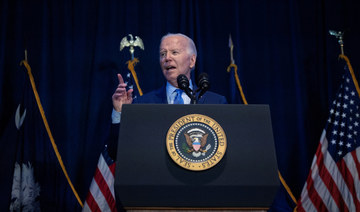WASHINGTON: Senators on Sunday released a highly anticipated $118 billion package that pairs border enforcement policy with wartime aid for Ukraine, Israel and other US allies, setting off a long-shot effort to push the bill through heavy skepticism from Republicans, including House Speaker Mike Johnson.
The proposal could be the best chance for President Joe Biden to resupply Ukraine with wartime aid — a major foreign policy goal that is shared with both the Senate’s top Democrat, Sen. Chuck Schumer, and top Republican, Sen. Mitch McConnell. The Senate was expected this week to hold a key test vote on the legislation, but it faces a wall of opposition from conservatives.
With Congress stalled on approving $60 billion in Ukraine aid, the US has halted shipments of ammunition and missiles to Kyiv, leaving Ukrainian soldiers outgunned as they try to beat back Russia’s invasion.
Biden said he “strongly” supports the bipartisan deal that also tightens US asylum laws. “We’ve reached an agreement on a bipartisan national security deal that includes the toughest and fairest set of border reforms in decades. I strongly support it,” he said in a statement.
He urged Congress to “swiftly pass” the deal and “get it to my desk so I can sign it into law immediately.”
He said the Senate proposal “allows the United States to continue our vital work, together with partners all around the world, to stand up for Ukraine’s freedom and support its ability to defend itself against Russia’s aggression.”
And on the border, Biden said that the immigration system has been broken for too long, and it’s time to fix it. “It will make our country safer, make our border more secure, treat people fairly and humanely while preserving legal immigration, consistent with our values as a nation,” Biden said.
The new bill would also invest in US defense manufacturing, send $14 billion in military aid to Israel, steer nearly $5 billion to allies in the Asia-Pacific, and provide humanitarian assistance to civilians caught in conflicts in Ukraine and Gaza.
“The United States and our allies are facing multiple, complex and, in places, coordinated challenges from adversaries who seek to disrupt democracy and expand authoritarian influence around the globe,” Schumer said in a statement.
In a bid to overcome opposition from House Republicans, McConnell had insisted last year that border policy changes be included in the national security funding package. The bill would overhaul the asylum system at the border with faster and tougher enforcement, as well as give presidents new powers to immediately expel migrants if authorities become overwhelmed with the number of people applying for asylum.
However, in an election-year shift on immigration, Biden and many Democrats have embraced the idea of strict border enforcement, while Donald Trump and his allies have criticized the proposed measures as insufficient.
Republicans have also been reluctant to give Biden a political win on an issue they see as one of his biggest vulnerabilities. They have argued that presidents already have enough authority to curb illegal border crossings — a stance that would ensure immigration remains a major issue in the presidential election. But at the same time, House Republicans have also pushed for their own, stricter version of border security legislation.
Johnson, a Republican of Louisiana, told NBC’s “Meet the Press” on Sunday that he had tried to involve House Republicans directly in the Senate’s negotiation, but was rebuffed. He added he was unaware of the bill’s details, but thought the solution to border problems should be a House proposal of hard-line immigration measures.
“What we’re saying is you have to stem the flow,” Johnson said. He also made it clear that he — not Trump — would decide whether to bring the bill to the floor if it passes the Senate.
But in a further sign that Johnson is resistant to the Senate package, he indicated Saturday that the House will vote on a separate package of $17.6 billion of military aid for Israel — a move that allows House Republicans to show support for Israel apart from the Senate deal.
Still, Sen. Kyrsten Sinema, an Arizona independent who negotiated the border proposal, told CBS’ “Face the Nation” that the legislation would be “realistic, pragmatic, and the strongest solution to our border crisis in my lifetime.”
“I feel confident that when our bill passes the Senate and gets to the House, members of the House, including Speaker Johnson, will have had ample opportunity to read, understand the bill and ask questions,” Sinema said.
The border proposal, which took months to negotiate, is aimed at gaining control of an asylum system that has been overwhelmed by historic numbers of migrants coming to the border. The bill proposes an overhaul to the system with tougher and quicker enforcement measures.
If the number of illegal border crossings reaches above 5,000 daily for a five-day average, an expulsion authority would automatically kick in so that migrants are sent back to Mexico without an opportunity to make an asylum claim. If the number reaches 4,000, presidential administrations would have the option of using the expulsion authority.
Biden, referencing the authority, has said he would use it to “shut down the border” as soon as the bill is signed into law.
White House spokesperson Andrew Bates said Sunday that Johnson has “continued to tie himself in knots to delay border security, delay crucial investments in the fight against fentanyl, and delay Border Patrol hiring — as a host of his House Republican colleagues openly state that they only oppose the bipartisan border deal because of former President Donald Trump.”
At the state level, Republican governors have considered sending National Guard troops to the border. Texas Gov. Greg Abbott, who again led a group of more than a dozen other GOP governors to the southern border near Eagle Pass on Sunday, has been cheered on by those in his party over his extraordinary showdown with the Biden administration regarding immigration enforcement.
The bill would allot $20 billion to immigration enforcement, including the hiring of thousands of new officers to evaluate asylum claims, as well as hundreds of Border Patrol agents. Some of that money would go to shelters and services in cities across the US that have struggled to keep up with the influx of migrants in recent months.
Migrants who seek asylum, which provides protection for people facing persecution in their home countries, would face a tougher and faster process to having their claim evaluated. The standard in initial interviews, known as credible fear screenings, would be raised, and many would receive those interviews within days of arriving at the border. Final decisions on their asylum claims would happen within months, rather than the often years-long wait that happens now.
Among Democrats, the tougher asylum standards have raised concern, especially from progressive and Hispanic lawmakers. While the wings of both parties have been openly critical of the policies under discussion, many have withheld final judgment until they can review the text of the bill, which was a closely guarded secret in the Capitol.
The $14 billion in the package intended for military support for Israel could also splinter Democratic votes. Sen. Bernie Sanders, an independent of Vermont, is pushing to strip $10 billion for offensive weaponry for Israel from the package while maintaining money for defensive systems.
House Democratic Leader Hakeem Jeffries suggested in an interview on ABC’s “This Week” that he would be supportive if it gets to the House.
“It should not be dead on arrival,” he said. “We need more common sense in Washington, D.C., less conflict and less chaos. We’re in a period of divided government. That means we should be trying to find bipartisan common ground.”
Senators completed the border proposal on Friday, but other portions of the package, including aid for US allies, investments in defense manufacturing capabilities and humanitarian assistance for people caught up in conflicts in Gaza and Ukraine, were still being negotiated by Senate appropriators.
However, Sen. Lindsey Graham, a South Carolina Republican, suggested during an interview on “Fox News Sunday” that GOP senators would push to slow the Senate from advancing the bill quickly.
“We’re not going to deal with this next week,” he said. “It’s too important.”






















